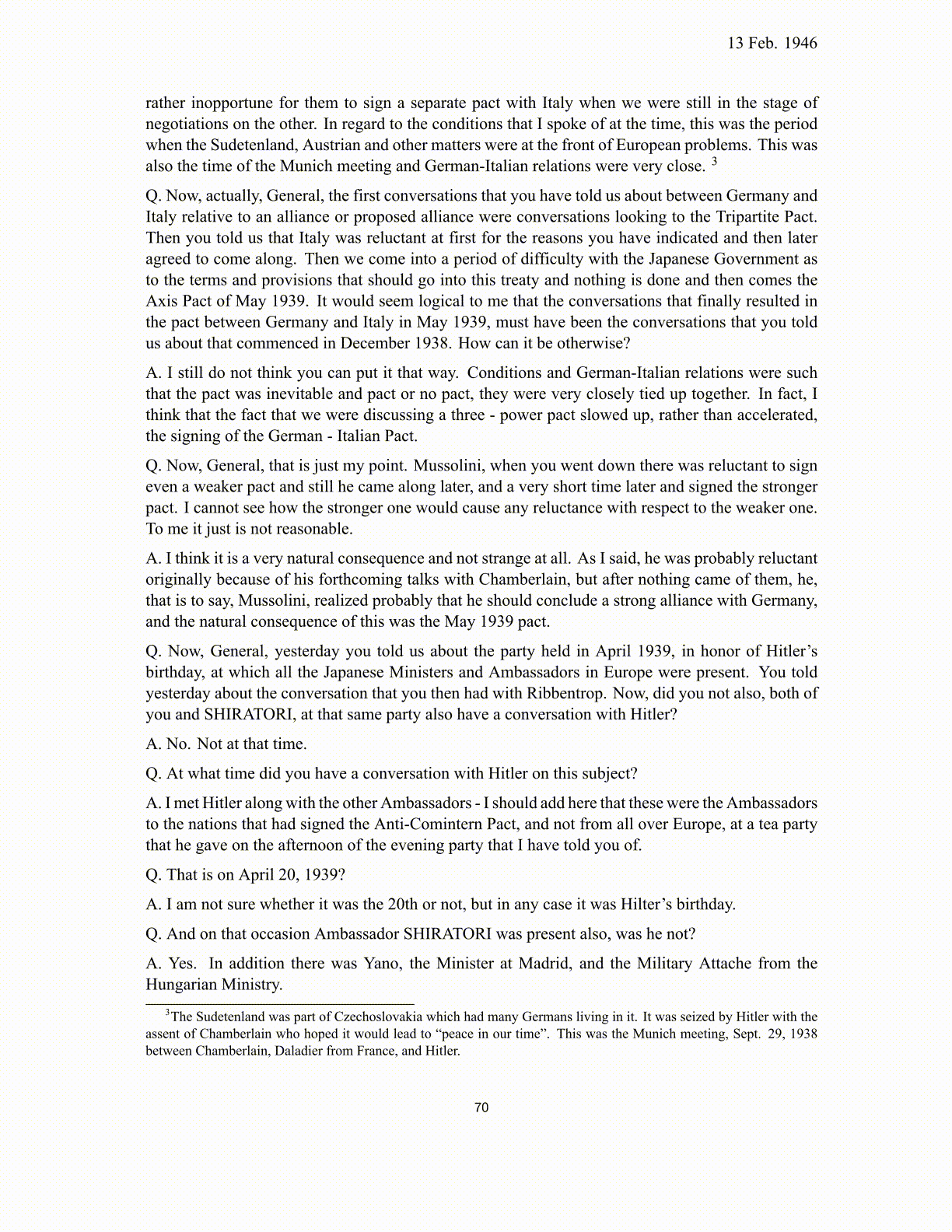
13 Feb. 1946 rather inopportune for them to sign a separate pact with Italy when we were still in the stage of negotiations on the other. In regard to the conditions that I spoke of at the time, this was the period when the Sudetenland, Austrian and other matters were at the front of European problems. This was also the time of the Munich meeting and German-Italian relations were very close. 3 Q. Now, actually, General, the first conversations that you have told us about between Germany and Italy relative to an alliance or proposed alliance were conversations looking to the Tripartite Pact. Then you told us that Italy was reluctant at first for the reasons you have indicated and then later agreed to come along. Then we come into a period of difficulty with the Japanese Government as to the terms and provisions that should go into this treaty and nothing is done and then comes the Axis Pact of May 1939. It would seem logical to me that the conversations that finally resulted in the pact between Germany and Italy in May 1939, must have been the conversations that you told us about that commenced in December 1938. How can it be otherwise? A. I still do not think you can put it that way. Conditions and German-Italian relations were such that the pact was inevitable and pact or no pact, they were very closely tied up together. In fact, I think that the fact that we were discussing a three - power pact slowed up, rather than accelerated, the signing of the German - Italian Pact. Q. Now, General, that is just my point. Mussolini, when you went down there was reluctant to sign even a weaker pact and still he came along later, and a very short time later and signed the stronger pact. I cannot see how the stronger one would cause any reluctance with respect to the weaker one. To me it just is not reasonable. A. I think it is a very natural consequence and not strange at all. As I said, he was probably reluctant originally because of his forthcoming talks with Chamberlain, but after nothing came of them, he, that is to say, Mussolini, realized probably that he should conclude a strong alliance with Germany, and the natural consequence of this was the May 1939 pact. Q. Now, General, yesterday you told us about the party held in April 1939, in honor of Hitler’s birthday, at which all the Japanese Ministers and Ambassadors in Europe were present. You told yesterday about the conversation that you then had with Ribbentrop. Now, did you not also, both of you and SHIRATORI, at that same party also have a conversation with Hitler? A. No. Not at that time. Q. At what time did you have a conversation with Hitler on this subject? A. I met Hitler along with the other Ambassadors - I should add here that these were the Ambassadors to the nations that had signed the Anti-Comintern Pact, and not from all over Europe, at a tea party that he gave on the afternoon of the evening party that I have told you of. Q. That is on April 20, 1939? A. I am not sure whether it was the 20th or not, but in any case it was Hilter’s birthday. Q. And on that occasion Ambassador SHIRATORI was present also, was he not? A. Yes. In addition there was Yano, the Minister at Madrid, and the Military Attache from the Hungarian Ministry. 3 The Sudetenland was part of Czechoslovakia which had many Germans living in it. It was seized by Hitler with the assent of Chamberlain who hoped it would lead to “peace in our time”. This was the Munich meeting, Sept. 29, 1938 between Chamberlain, Daladier from France, and Hitler. 70